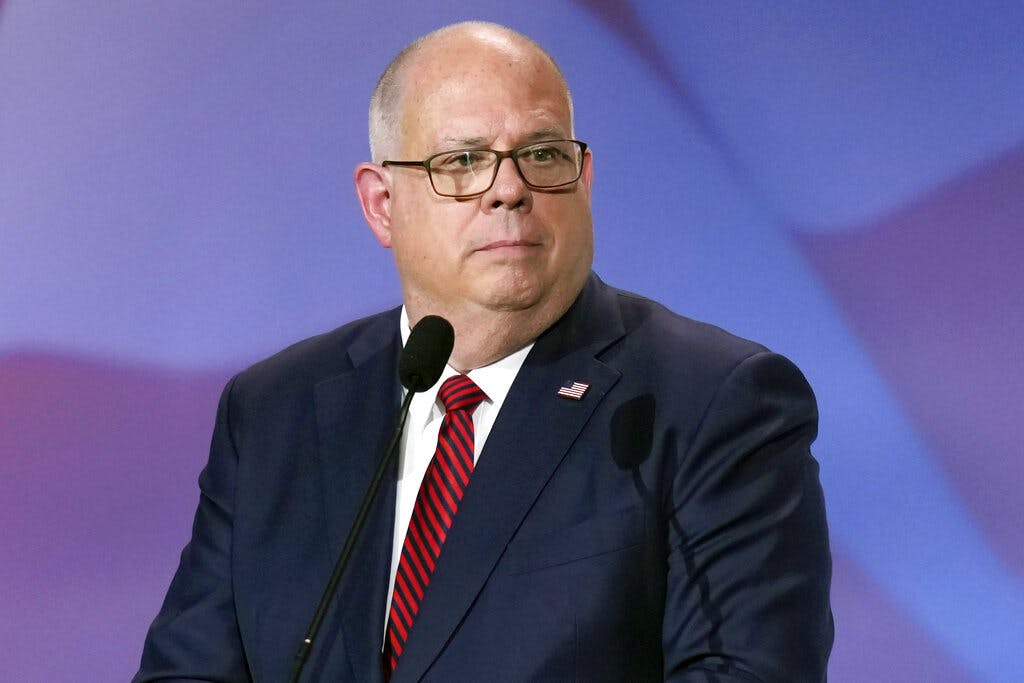Battle To Redefine Governor Hogan Erupts in Wake of Maryland Primaries
The post-primary blitz of the Maryland airwaves reflects concern among Democrats and hope among Republicans that Governor Hogan’s candidacy could put Maryland into play.

With the Maryland Senate primary over, the race between Governor Hogan and the Prince George’s County executive, Angela Alsobrooks, is just beginning. Already, Democrats and Republicans in the state are rolling out conflicting messaging over the image of Mr. Hogan, a popular Republican ex-governor in a deeply Democratic state.
On Tuesday, Ms. Alsobrooks defeated Congressman David Trone by 54 percent to 42 percent in Maryland’s Democratic primary, while Mr. Hogan waltzed to victory with 62 percent support in the GOP primary. By Wednesday morning, the Democratic Senatorial Campaign Committee had already rolled out an attack ad against Mr. Hogan, titled “Lifelong Republican.”
“I’m a traditional Republican that’s been involved in the party for 50 years,” Mr. Hogan says in the ad before it cuts to a clip where the speaker says, “Larry Hogan winning a seat in Maryland means Mitch McConnell or Josh Hawley or all of those folks will be in the majority.”
The ad, which also touches on Senator Graham’s promise of a national abortion ban and Mr. Hogan’s promise to caucus with Republicans, wasn’t the only new spot rolled out in the wake of the primary.
Mr. Hogan’s campaign released an ad announcing the beginning of a group billed as “Democrats for Hogan,” featuring a former Democratic state senator, Bobby Zirkin, endorsing Mr. Hogan for Senate. “He is exactly the leader we need. I encourage all Democrats — all of my fellow Democrats to really review the record of Governor Hogan,” Mr. Zirkin says in the ad.
Mr. Hogan in a statement accompanying the ad also promised to “continue to be the same strong independent leader for Maryland that I always have been.”
Other prominent Democrats have also stepped up in an effort to define — or redefine — Mr. Hogan early in the general election cycle, like Congressman Jamie Raskin, who is from Maryland.
“He has to pander to the Trumpian base, and the reason they want him there is so he will be another brick in the wall of GOP support for a right-wing Trump agenda,” Mr. Raskin told CNN.
The post-primary blitz of the Maryland airwaves reflects concern among Democrats and hope among Republicans that Mr. Hogan’s candidacy could put Maryland into play for Republicans, who only need to flip West Virginia and one other Senate seat to assume control of the upper chamber.
Maryland has not elected a Republican to the Senate since 1980, and that was the re-election of Senator Mathias, who was first elected in 1968. On the presidential level, Maryland has not supported a Republican since 1988.
What little polling that has been done on the Maryland general election is divided. On one hand, an April 10 survey from OpinionWorks, the Baltimore Sun, the University of Baltimore, and WBFF found Mr. Hogan leading Ms. Alsobrooks by 18 points. An early May survey from Emerson College, the Hill, Nexstar, and WDVM-TV, on the other hand, found that Ms. Alsobrooks would lead Mr. Hogan by 10 points in the matchup.
While polling this far from an election is not normally predictive of final results, the data have done little to quell anxieties among Democrats that Mr. Hogan may be a uniquely strong Republican candidate in Maryland.
In an analysis of the race, the associate editor of Sabato’s Crystal Ball at the University of Virginia Center for Politics, Miles Coleman, said, “Though Hogan’s entry gives Republicans their best possible recruit in a rough state, Senate races are different than gubernatorial contests.”
“Are Republicans favored now? No, not even close—Democrats are still strongly favored to hold this open seat. But are Hogan’s chances zero? We don’t think so. Simply put, despite the terrain of the state, Maryland is now more of a live contest,” Mr. Coleman said.
His reasoning is that the stakes of a gubernatorial and a Senate race are fundamentally different and that voters are less inclined to vote for a candidate from another party in a Senate race.
The most recent example of a state that supported a Senate candidate from a party different than voters’ normal presidential preference is West Virginia, where Senator Manchin went from being a Democratic governor of a Republican state to being a Democratic senator.
That situation, though, was substantially different from what is playing out in Maryland, because West Virginia was still dominated by Democrats at the state level, despite supporting Republicans for president since 2000.

